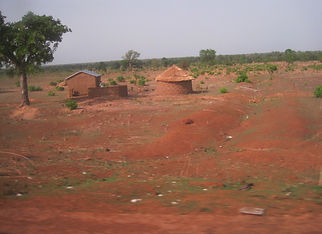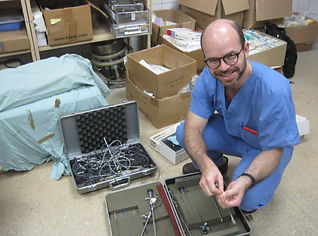

Togo ( West Central Africa)
Brigid and I were honored to be chosen for a World Medical Mission Surgical specialty team. The team was composed of 2 Samaritans Purse staff members and 6 volunteers with the diverse talents needed to accomplish our mission.
Our mission was to develop a urology capability at the Hospital of Hope (HOH) in Mango, Togo. Samaritans Purse donated the needed instruments and supplies. Dr. Joseph Klink and I taught urology surgical skills to the long term missionary general surgeons at HOH. Brigid taught the staff how to maintain, prepare and select needed instruments for the surgeries. Rachel, Sarah, and Nishelle taught patient preparation, recovery, and hospital management of the patients. Scott Symer, from Samaritans Purse was our biomedical technician. Cindy Albertson RN MPH, from Samaritans Purse was our team leader and coordinator.
Togo is in west central Africa, and Mango is located in the northern part of Togo. Mango and the surrounding area is about 80% Muslim. Our patients were mostly Muslim, and over half were from the surrounding countries.

The daytime temperatures were from 100 to 110 degrees with an even hotter feel due to the intense sun. In the dry season Mango feels like a desert. Local custom requires that women wear skirts below the ankles.
The population mostly lives in small houses constructed of mud and sticks. They have no plumbing or electricity. Cooking and cleaning are done outside of the house.
Travel to Mango is cumbersome. There are regular flights from Paris or Brussels to Lome, Togo. The drive from Lome to Mango takes 9 hours, mostly over bad roads. There are many military checkpoints.
Togo has about 40 tribes with 40 separate languages. French is the government language due to the colonial history.



Bill is orienting us to the hospital. The enclosed grounds are over 60 acres including a generator, a safe water source, a farm, animals, guest housing, and staff housing.
HOH is newly constructed and has a modern infrastructure.


They make their own IV solutions. Considering the limited local resources and unreliable supply routes, it is preferable to make IV solutions on site.
Using available materials, we fabricated this system to deliver water for prostate resections.
The resectoscope sheath that we received was incompatible with our other instruments. Scott shortened and re-constructed the sheath, but it broke again before long. We were challenged by many incompatible instruments and incomplete sets of instruments, but we managed to make things work.
Brigid is teaching the hospital staff about maintenance, cleaning, and selection of instruments for a transurethral prostate resection.




We taught cystoscopy, transurethral prostatectomy, open stone surgery, and urethral reconstructive surgery to the long-term general surgeons and staff at Hospital of Hope.




Patients and their families travel for days to reach the hospital. The families camp on the ground or stay in covered stalls when their family member is in the hospital or recovering from surgery.
Mosques are seen everywhere. Our patients advised us that outside extremists are coming to the villages and attempting to radicalize the peaceful Muslim residents. The villagers are sending these extremists away.
The acts of care and kindness at Hospital of Hope speak louder that the language of hate. Our missionaries in Mango are on the front lines of the battle for the hearts, minds, and souls in West Africa.